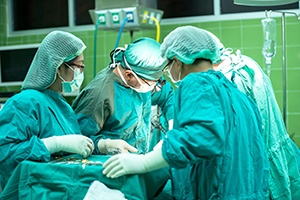Unsafe Medical Devices
 Cases involving defective medical devices are very complex and often end up in multidistrict litigation, or an MDL. It is important to hire an attorney experienced with the MDL process, risks, benefits, and challenges. Our lawyers have been appointed by federal judges to leadership positions in MDLs and have worked with MDLs across the country.
Cases involving defective medical devices are very complex and often end up in multidistrict litigation, or an MDL. It is important to hire an attorney experienced with the MDL process, risks, benefits, and challenges. Our lawyers have been appointed by federal judges to leadership positions in MDLs and have worked with MDLs across the country.
Each year, hundreds of thousands of patients are treated for injuries directly linked to medical devices. In many years, over 50,000 of those injuries have resulted in hospitalization or death. While advances in technology have led to the development of beneficial medical devices, these technological advances often outpace meaningful safety studies. Unsafe medical devices have flourished in a regulatory environment that has encouraged a culture of placing profits over patient safety.
Medical devices are intended to improve or maintain a patient’s health, and they serve a critical role in modern health care. But when medical devices are defective, they can cause serious injury or death. In the first half of 2010 alone, 21 medical devices were recalled by the FDA because they presented a risk of serious injury or death.
Medical devices can be defective in a number of ways. Generally, a medical device’s defect is caused by a design defect, a manufacturing defect, or a warning defect. A manufacturer’s design for a medical device must be submitted to the FDA for approval, but FDA approval does not guarantee product safety. Even when a medical device is safely designed, the manufacturing process may deviate from the design or cause an otherwise safe device to be unsafe. Some medical devices carry inherent risks because of their nature even when designed and manufactured properly, and an inadequate warning regarding the product can unnecessarily subject patients to harm.
The medical devices that have harmed our clients include surgical robots, hip implants, knee implants, shoulder implants, IVC filters, transvaginal mesh, hernia mesh, drug coated stents, operating room patient heaters, pacemakers, infusion pumps, and many others.
